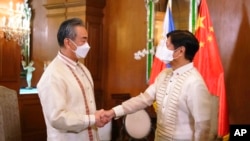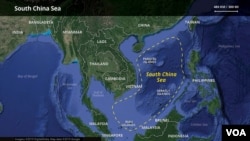Analysts say a meeting this week between China and the new government of the Philippines has set the stage for mending ties that have been frayed by a festering maritime sovereignty dispute.
Chinese Foreign Minister Wang Yi met in Manila Tuesday and Wednesday with Philippine Foreign Secretary Luis Enrique Manalo, an official in the week-old government of President Ferdinand Marcos Jr. The new leader is the son of the late President Ferdinand Marcos.
Experts in Manila say Wang probably wanted to get to know Manalo, a career diplomat, and find out something about the new president. They also say the two sides could work on reviving a friendship that was cemented in 2016 despite the Philippine government’s historic alliance with the United States.
“There are a lot of issues, but one thing I think that could continue to be done is that there will still be accommodations on both sides, because they want to have good relations,” said Ramon Casiple, an independent political analyst in Manila. The China friendship of years past, he said, “will certainly be continued on into this administration.”
Chinese coast guard vessels and fishing fleets have returned over the past four years to tracts of the South China Sea claimed by the Philippines, testing former president Rodrigo Duterte’s initial friendship with Beijing. More than 200 Chinese boats that moored last year off a reef contested by the two countries particularly angered people in Duterte’s Cabinet.
China’s official Xinhua news agency reported after the meetings that the Philippine side “believes that the problem involving islands and reefs in the South China Sea should be settled through diplomatic means and peaceful consultations with a view to jointly safeguarding peace and stability there.”
Marcos also had told reporters before the meeting he was open to military exchanges with China.
Wang advocated “good-neighborliness and friendship and deepen mutually beneficial cooperation,” Xinhua reported.
Steady Sino-Philippine ties would reduce U.S. influence in East Asia’s waterways, experts have told VOA. Beijing resents U.S. warship passages and military training in Southeast Asia for hindering its activity in the South China Sea. Washington wants the resource-rich 3.5 million-square-kilometer sea to remain open internationally, despite Chinese claims to about 90% of it.
The younger Marcos “has had a close relationship with Beijing” and appears ready to prioritize Philippines-China ties even above those with the United States, the Council on Foreign Relations, a U.S. research institution, said in a June 24 commentary.
Marcos is expected to tap China for economic help as Duterte did in 2016, the commentary said. Beijing put money behind transportation infrastructure but missed a pledge of $24 billion. The two countries may restore a plan floated under Duterte to drill together for gas or oil under the South China Sea, Casiple forecast.
“Whether Marcos Jr. is able to get China to deliver on more of what it promised Duterte – more funding for infrastructure projects that actually get built – may determine whether he is able to pull off this move closer to China, or whether public opinion will swell to even higher anti-Beijing heights, limiting his options with China, like Duterte in the latter part of his presidency,” the Council on Foreign Relations commentary said.
Wang probably tried this week to gauge Marcos’ character and learn better how China should relate to him, said Jay Batongbacal, international maritime affairs professor at the University of the Philippines Quezon City.
Although Marcos said during his campaign he wanted closer ties with Beijing, Batongbacal said the new leader has not spelled out a clear China policy. The South China Sea dispute will inevitably play a part in it, he said.
“Even though both sides kept emphasizing that Philippines-China relations should not be defined by the South China Sea issues, still it does impact gravely on perceptions as well as on (overall) relations,” the professor said.
Some Filipinos think China has already made a significant impact via infrastructure project funding and private business investments by Chinese entrepreneurs, said Marivic Arcega, a politically active owner of a livestock feed business in the mountains near Manila. “Basically, they’ll be like buddies when it comes to regional international issues,” she said.















